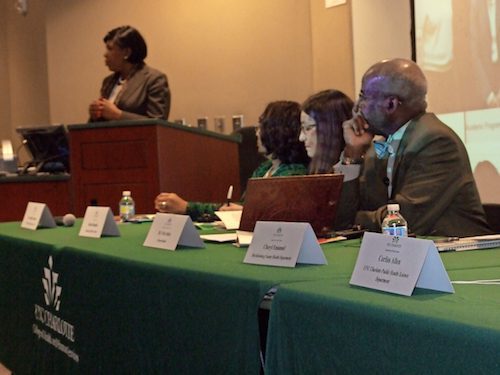CHHS Conference Addresses Mecklenburg County Health Disparities

North Carolina ranked 37th in a recent state-by-state assessment of the nation’s health. While public health solutions are very rarely defined by a single action or limited series of actions, efforts to address the needs of vulnerable and underserved populations will play an important role in improving the overall health of our state.
An inaugural event conceived by a group of faculty across three academic units in the College of Health and Human Services brought together a variety of experts and an audience of nearly 100 on Friday to discuss remedying health disparities in minority populations.
The event featured NC State Representative Beverly Earle, as well as faculty from CHHS and local health care providers. Mrs. Earle is an eleven term representative and member of NC House Appropriations Committee for Health and Human Services. The UNC Charlotte conference occurred in conjunction with UNC Chapel Hill’s 36th Annual Minority Health Conference, and offered a simulcast featuring national speaker, William Darity.
Dr. Crystal Piper, an assistant professor in the Department of Public Health Sciences, helped organize the event. She said it was intended to convene those with a genuine interest in addressing health disparities and “establishing a network of researchers, practitioners, policy makers, and community members that will develop a platform for prioritizing health disparities facing our communities, and then to determine the necessary solutions, actions, policies and programs to overcome these problems.”
Dr. Judy Cornelius from the School of Nursing sat on the expert panel, as did a community health administrator for Mecklenburg County Health Department, and representatives from three local healthcare providers.
A diverse array of students from across CHHS also attended the event. Dr. Piper said racial and ethnic minorities are severely underrepresented among American healthcare workers, and that closing that gap is essential to eliminating health disparities.
Panelist Brisa Hernandez is a Research Project Manager for the Department of Family Medicine within Carolinas Healthcare System. Hernandez emphasized the importance of understanding the social determinants underlying health disparities and taking a broad perspective, noting that “it isn’t a black and white issue…health disparities cover a wide range of minority populations.”
Fellow panelist Dr. Yele Aluko, a senior vice president at Novant Health, agreed. Dr. Aluko said a higher level of engagement from community leaders and developing a coalition capable of delivering long-term sustainability are two key aspects of addressing health disparities.
The event’s co-sponsors, the CHHS Social Work Club and the Association of Nursing Students, provided health screenings and fitness education for attendees. The conference is scheduled to occur again next year as an annual event.